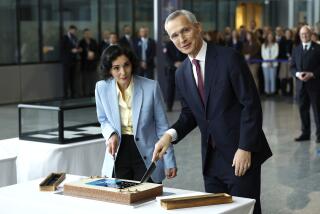NATO Action Tests Peace in Bosnia
UGLIJEVIK, Bosnia-Herzegovina â As Russian diplomats sought in vain to broker a Kosovo compromise and NATO threatened to escalate its bombardment of Yugoslavia, the Russian commander at this Bosnian peacekeeping base gestured skyward Tuesday and denounced âthis genuine act of aggression.â
âItâs wrong to be killing peaceful people and threatening to unleash a wider war,â Col. Nikolai I. Ignatov said with a mix of sincerity and menace. âThis will not bring peace and is of no help to anyone.â
As Russiaâs top soldier in the international Stabilization Force, SFOR, in Bosnia-Herzegovina vented his views about the futility of trying to bomb Yugoslav President Slobodan Milosevic into submission, he repeatedly waved in the direction of a U.S. liaison officer as if he were the embodiment of the North Atlantic Treaty Organization.
The 21 American officers camped together with the highly opinionated and 1,340-strong Russian brigade patrolling this hostile Serb-held territory in northeastern Bosnia near the Yugoslav border say they donât take it personally when the talk gets heated and NATO is cast as an alliance of baby-killers.
Ignatov and other Russians say they respect the individuals they have come to know in the learning experience of joint peacekeeping work with erstwhile Cold War enemies and hold no grudge against U.S. partners for their governmentâs participation in what Russians see as a destabilizing action.
But the Russians contend that the weeklong NATO campaign to punish the Yugoslav regimeâs terrifying crackdown on ethnic Albanians in Kosovo province has already set back the cause of peace in Serb-held regions of Bosnia--and that its continuation could anger Moscow enough to pull out its troops altogether.
Russian participation in SFOR was a key factor in winning Bosnian Serb approval of the Balkan nationâs October 1995 peace agreement, and Moscowâs withdrawal would remove what little trust the Serbs in Republika Srpska, the Bosnian Serb half of the country, have in SFOR. Serbs and Russians share the Christian Orthodox faith and the Slavic languages written with the Cyrillic alphabet.
Since the NATO bombings of military targets in Yugoslavia began, Bosnian Serbs who largely sympathize with their Yugoslav brothers have pelted rocks at U.S. and other NATO-nation missions, slashed tires on Western vehicles, beaten journalists trying to film their outbursts and held daily demonstrations to denounce NATO.
Left without a sympathetic unit within the hated Western forces deployed in their land, Bosnian Serbs could cease what little cooperation they have offered in international attempts to mend divided Bosnia. Experts fear that the Serbs may despair of the foreign interventions and resume settling territorial disputes with Croats and Muslims at gunpoint.
âIf we were to leave here suddenly, everything weâve been able to accomplish here over these last years in bringing about stability and guaranteeing peace would just be wasted,â warned Ignatov, noting that he is duty-bound to fulfill any order from Moscow, even if it threatened a new era of Cold War.
The increasingly shrill outpourings throughout Serb-held territory in Bosnia have made Americans vulnerable to rogue acts of retaliation, encouraging the U.S. liaison force working with the Russians here to steer clear of a lengthening list of trouble spots.
In the town of Bijeljina, just northeast of here, Bosnian Serbs massed Tuesday to scream accusations that NATO has become a terrorist organization and President Clinton the worldwide leader of neo-fascists.
âIt makes sense to keep a low profile,â said Maj. Michael Vandevelde, one of the U.S. officers seconded to the Uglijevik base from a Russian-language program run by the United States in Germany.
The Americans acknowledge that the ongoing NATO confrontation with Yugoslavia exerts pressure on a delicately constructed relationship, but they stop far short of the Russian warnings that peace in Europe hangs by a slender thread.
âI wouldnât say we are worried about our work being undermined here. This situation was to be expected considering the sector weâre in,â said Capt. Bill Benson, the liaison officer who serves as a convenient target for Ignatovâs blasts against NATO. âBut the Russians are very conscious of our security and very protective when we go on patrol. They look after us.â
Relations on the base, where Russian and U.S. units are separated by a branch of the Janja River spanned by a Bailey bridge, are now characterized by a blend of camaraderie and contention.
Maj. Andrei Tolstoguzov privately emulates his commanderâs opposition to NATO airstrikes, confirming that the attacks are turning locals against SFOR and acknowledging that ârelations were in need of improvementâ even before rockets started flying.
But with comradely conniving of his American colleagues, he wins a bag of chocolate candies from a stash hidden by Vandevelde--and with it affirmation of the peacekeeping teamâs success in holding its polarized views on the NATO assault in check.
âIt would be best if we kept our opinions to ourselves,â the Russian major noted.
âAt least aside from those we can agree on, like having chocolate.â
More to Read
Sign up for Essential California
The most important California stories and recommendations in your inbox every morning.
You may occasionally receive promotional content from the Los Angeles Times.











